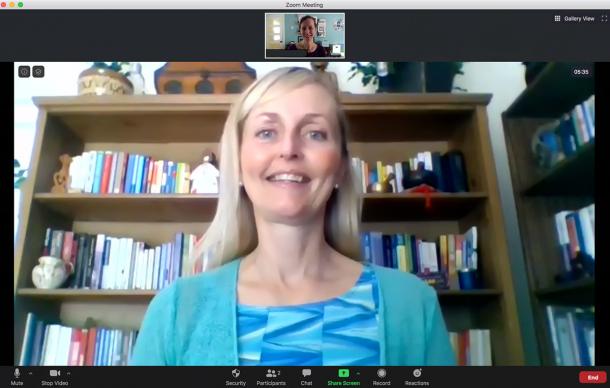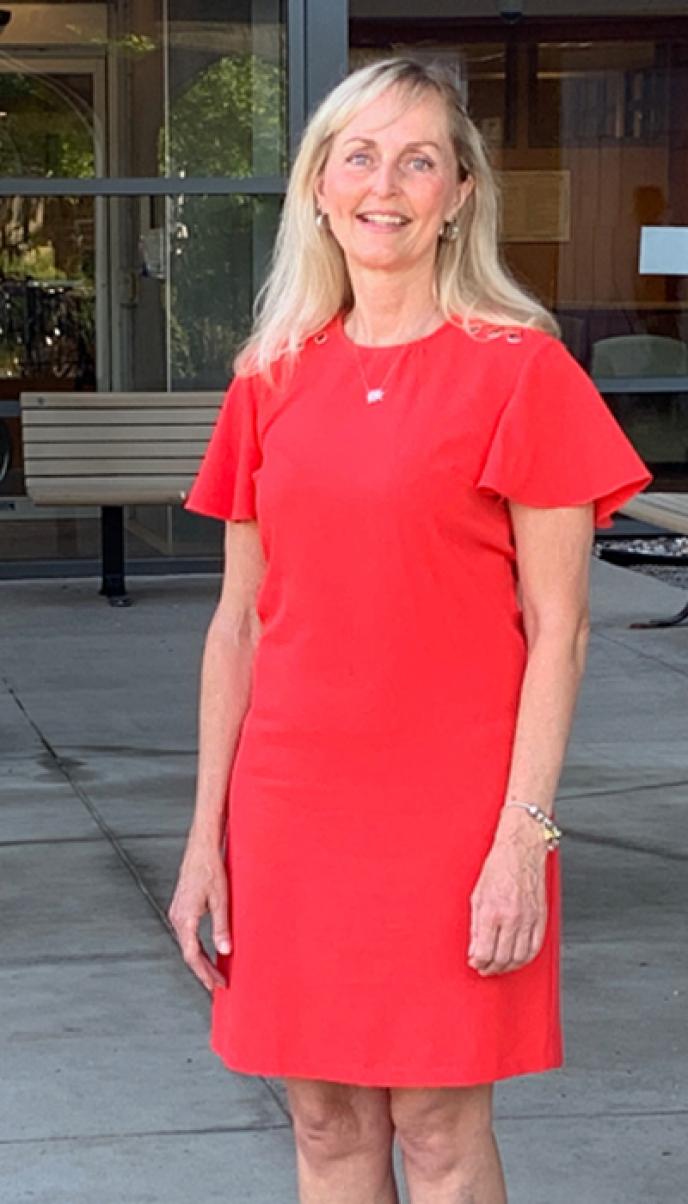Back in March, many events at The Royal were cancelled in order to slow the spread of coronavirus, including school tours, workshops and professional conferences, and support groups for clients and families.
Some events are easy to postpone, but Juliet Haynes, the family engagement and experience coordinator at The Royal, wanted to find a way to keep family support groups going.
Family support groups are a way for people who are caring for a loved one with a mental health issue to learn from experts, ask questions, and find support.
Pre-COVID, family support groups were 90-minute sessions that took place in person, twice a month at The Royal. Free to attend and open to the public, they covered topics such as navigating the mental health system, dealing with grief, and stress reduction.
When physical distancing guidelines were put in place, the only way the family groups could continue was online. Although virtual support groups aren’t exactly new, Haynes proposed taking them a step further.
“A novel virus called for novel action,” she laughs.
The pilot took place on March 23. Haynes invited twenty people who regularly attend family support groups to participate in a test session using Zoom, a popular videoconferencing platform. The pilot was a success, with families indicating they were excited and willing to continue with family groups using videoconferencing technology.
Two online support groups are now scheduled each week with eight-10 participants in each session. They take place during the day, over lunch and at 4 p.m., giving participants and clinicians more flexibility. Pre-COVID, they were held twice a month in the evenings with an average of 20-25 people attending each one.
New guidelines were developed to help make the Zoom support groups a useful, private, and safe space for all. (For example, family group participants have to register ahead of time, and be residents of Ontario.)
Of course, there have been some hurdles. While Zoom meetings can be accessed through desktop computers and all manner of mobile phones and devices, limited internet or data plans or equipment can pose a barrier. And like with any new technology, it can take time to learn how to use it, and get used to its idiosyncrasies. For example, Zoom can’t handle the audio when multiple people try to speak at the same time, but participant guidelines help make sure everyone is heard.
“It’s new for me, too. And we’re all muddling through and forgiving of each other,” laughs Haynes. “Everybody is more proficient now.”
Haynes reflects how the needs of family members have evolved since that first pilot. Initially, people wanted basic information about COVID-19, hospital and community practices, and how our clients were going to be served during this time.
“Now that they’ve received that information they’ve returned to asking questions that we normally get in our family groups,” says Haynes. (For example, how to communicate with loved ones when they’re not well, or how to manage expectations.) “These are the age old questions that we get all of the time.”
Of course, measuring success is part of any project at The Royal, and the virtual support groups are no exception.
Every week, participants share their feedback through an online survey. At this point, the majority of respondents are “extremely likely” or “highly likely” to recommend the group to others.
The surveys are also a way of making sure families are getting what they need. Early on, participants asked for more structure and a weekly overview, which Haynes and her team delivered. Participants also suggest topics for future group sessions. For example, someone mentioned difficulty sleeping so a group on sleep hygiene was added to the schedule.
“I think that’s also why our groups are popular, is we ask people what they want and then we give them what they want. And only by them giving us feedback are we able to do that,” says Haynes.
“Every single one of us has resilience, and we can all learn from one another. That’s the beauty of it.”
Families have adjusted well to the online groups, says Haynes. They are sustaining their momentum and she predicts the numbers will grow.
There are definite advantages to hosting support groups online. Some participants live in smaller communities outside of Ottawa, and online sessions remove the burden that comes with travel time and cost of parking. Haynes says some people may have never made it to an in-person group because of these reasons.
One might think that the opposite would be true of a virtual platform but participants are getting to know one another in a way they didn’t in the larger in-person groups.
“Every single one of us has resilience, and we can all learn from one another. That’s the beauty of it,” says Haynes.
A few things you probably didn’t know about family support groups
The coronavirus, which has exacerbated depression, anxiety, loneliness, and financial stress for many people, has shone a spotlight on the urgent need for mental health support.
The family support groups at The Royal offer free access to a broad range of expertise, and you don’t need to have a family member at The Royal to participate.
“We often think it’s our loved one that has the mental health issue, but right now the family caregivers and supporters are struggling,” says Haynes.
“Most people come because they have a loved one with mental health issues, but they stay because they recognize we’re actually making it about them, and their own wellness.”
The future of family support groups at The Royal
Haynes has been busy meeting with other mental health-related organizations about starting their own virtual groups.
The future of online support groups – and whether they’ll continue at The Royal in this format after COVID – is still unclear.
It’s a good idea to serve people in different ways, and as Haynes points out, having a choice of virtual or in-person support groups will benefit a greater number of people out in the community.
“It’d be quite novel if we were able to continue to offer it in this form to people,” says Haynes. “I’d like to continue doing it because it’s been very well-received…. we keep it hopeful, we keep it strengths-based, and we build people up.”
Judy Thomas is supporting a family member at The Royal and has attended family support groups over Zoom.
“I’m certainly grateful for The Royal, for thinking outside the box and creating these opportunities for us,” says Thomas. “I would like to thank and acknowledge the social workers who stepped up.”
For more information about upcoming family support groups, see the Family Information and Support Groups on our website.



